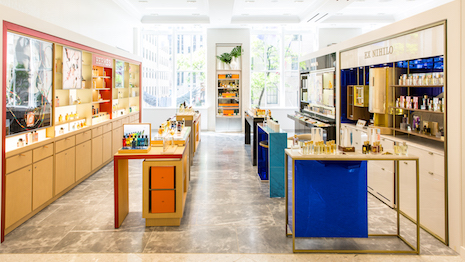NEW YORK – Being successful in today’s retail industry, which is so often weighed down with baggage and years of conventional methods of operation, is all about thinking radically.
At a panel hosted by the Robin Report in New York on June 5, a panel of retail executives spoke about what it means to think radically in a highly competitive retail world. The most important thing the panel struck on was the need for innovative ideas to be cultivated in a group setting.
"I think being radical is about finding like-minded people who focus on continuous improvement," said Darren Hull, senior vice president of technology at Williams-Sonoma. "You have to have speed and momentum and always be accelerating.
"It's about looking at successes on the quarter or on the year and being pleased but not satisfied."
Radicalization
It is no secret that the retail industry is incredibly competitive.
This is in no small part due to the outsize influence of Amazon. The company is larger than the next seven largest retailers combined, according to Robin Report.
Additionally, the arrival of mobile technology and ecommerce has made retailers’ jobs even harder.
"Now we are at an intersection where the newly emerging next generation of tech-armed consumer has more power than ever," said Robin Lewis, CEO of the Robin Report. "The meeting between online and brick-and-mortar is happening less and less.
"When they do meet, there is a big disconnect between what they want and what they are getting from retailers," he said. "They can scan more stuff on their phones in 10 minutes than they can shopping all day at the mall."

Shoppers that use AR are open to ditching in-store shopping. Image credit: Mastercard
As Amazon continually dominates the overall retail world, retailers need to radically rethink the ways in which they engage with customers. Everything from redesigning in-store experiences to more deeply integrating online and offline shopping are all core tenets of the new radical retail.
But most importantly for one panelist was ensuring that every level of leadership at a retailer is on board with these ideas.
"You have to have the buy-in from leadership," said Marc Mastronardi, executive vice president of innovation at Macy's. "We are very fortunate in that our CEO has built a strategy for Macy's with clear defined pillars for innovation.
"He lifted us out of the organization and asked us to focus on innovation all day every day," he said. "Beyond that, you need to have a few early wins to build up credibility before you take on something really radical."
Retail revolution
As innovations such as augmented reality and voice assistants become more mainstream, consumers are expected to move even more of their shopping online.
The majority of consumers who have shopped online using augmented reality would be willing to give up the apparel in-store buying experience entirely, according to a new report from Adtaxi. While the luxury buying process is largely still driven by physical stores, technology could make more consumers willing to forego the bricks-and-mortar experience in the coming years (see story).
Some major luxury retailers have already radically reinvented their physical spaces in anticipation of retail’s evolution.
For example, department store chain Saks Fifth Avenue's has undergone a major renovation to make way for more accessories on its ground floor, but its new execution of the beauty department could be indicative of an emerging trend.

Saks new Beauty 2.0 department. Image credit: Saks
Saks’ uptown New York store has undergone significant refurbishment beyond a simple façade uplift, with a makeover in fundamental methods of business. The retailer's newly opened beauty department, named Beauty 2.0, has been moved to the second floor and offers a new strategy toward cosmetics buying to compete with retailers such as Sephora and Ulta (see story).
Most importantly for retailers looking to radically reinvent themselves is the expectation that not every idea will pan out. Retailers need to be brave enough to face failure in order to find true innovative success.
"Scar tissue is important if you want to be disruptive," said Mark Bozek, founder of Live Rocket. "You need to have some ideas that didn’t work out in order to get ahead."
{"ct":"2ZuFiFbCMaenY0tDwqc\/agFCq8ORRtnCPtr9hvJ4Ikub72yb+HcwxJZXGFVdturxusAASGFShqh93DCjdBfuGYpJgbuY7sKO89Gbn8D6nbTVR8qeuC4TEroMJuQ+\/MdbCG22j7f81M7uXurua8gdJ0PWuc0lFuzpfEnWYPBZjMU3Y2qHuz7iWmqyFiRORdsb4I\/I2vWPm8Ztp5tyfYV1Xq0FYQMt7CB\/uBvudktwicdfEL1nP2TQ9IglWD7pVOiFAUF9vKlE2BmZFwlLKufNhzbb09twG4+3JUQ9GSWfdACHfEvFUtIBUct9KQI9moRhhAn06ShlXZvOfEAfkhJ6uc6rx0Ptwg2JaXrKpJWiiaJoDBVraZaf8II6WbB1nT2tj+O9lEEv5gchZWPchz4bL0orPD4iM1LcVs1aZeb8tIIFeiML9untUWN5NFtzIk31IC1cS+d2bxWLvjrCCyhWgshtiN1AfaKXIDGUqItSdOKx1Wu2Xctdk2SzDKtYROJRxNbYFpNDVDJj2c\/KAl4LQ3\/mj3By5is6B+KyJaggWv7YbwmNOcvclhT1pN1RxY9sp50AiSI4zX\/kMgIEJqQsTnOouz7JpkwkhEWjMoVXgN9MRwEM0nwO2jT9UYD2Vll2fDp\/VxcCkg7IGe9czPEQ4koSFpzs3v3wmyEXqMtVVvUL8chYLj9pwh38Ob14F2NT3ytlsYcKHrS82m9tw6z0cm+mq+6HsGvhhchODuYTAtktfMv1W29zQUKkDCcO964t1IuI\/2fip4WyRfvZKzhIEbiVVR1XsYfPlI2e\/6EOyMCHI+kzerCCw+TZwYaU\/WtThFFG9HhwEjUUKrHD7AOr9mTSf2vCNJylPd7VPvxiHgNhmRgSSVzXHa7qnmH2Pr\/IKMBM8+lm1UrF6aq9P77bxySwZys3GBAroG2jK5whEy6woaYdPtlAB87m8cwHB4wsNoJYhhMo0DCidpInNnEr15D+EapbtpsyQ1DiXyF49\/gVPsvoN96RjIQcZmtKddzf2IrPkYkkFToZYVjv8pxPcxY5esFQZXg5el0MMDsLKNoOV2x6buO8\/mVzAvNigl3QNgQTPWbgcvlNE89dZVCN2D\/PUqAfRTTaW2rHriTvLceWcMViWxWiIdT8CA2w08fu47ICW7BD3KZS6oxe\/1aDsnne81Qu3wvpe60O1kdZ2QKZQfxCshuOXZgsF\/cO6ilgYghBzRCAUQYOkPtbwDheApTIdaqVnP6kNY7pzv7u+Rz4HRKIjG7oFUfBwR0d4Vf2oigQSJEXEBowpr6Y9kRxgLw\/JxYGbDlyREg7UArC1i6R3VVeUFKkI600Bn0xRYXoFBvRrMEsY1d2UnoL1inTjLIz1+81lB8cmBEzl4vwXvnz4OBN5IjNpsIFvU7vemTIkB2OdSFR7+4m68PB+O7cSo\/Jmd4ACYJogwLttn14AhV9+MoRFTLX10JWL7huZNey0e2tHCALCXBXeZZuP6iSPwuhASrxqdgNjb6i6S9jHyhI9X3zWfnHMxSHraKunucPRRDip\/n2mLwOvuBYh+wZ786MF0xriWyhjmDVt1ZIWOPFXYCStTcs7crZQycd3SHd+gJOy69jJxQrqpd2gVZ8NXmDLvLMfD\/EIbO+WB4OnK380S2Xwu3BtdFlmk0eWOPdNlVhkFhe0ijVYIZYj+gFz2yGahYmFdhwrWfn+z\/gbD5ruOpRD4HXeXHsgHsaCrnJj\/LobR\/v5cI2Dupux28BD7I+3CEcye+zyElegULOyxvYfDLRB3+ezUhsvXMzzTlvzNkyx4D8sPbE3NOPf4560oeyLrNgmX3VnPbGtVnwMRfdAqFPBqjixFLjZF29yB\/BSJk5kfZQCfqf8Qj0d3mIcdjRFE32I91FLC8jHmMwF3Z0DKMRJ3OyOF3R\/aNm8oiMqFmmpHNB0J8CAgLZ22CrX8lXRvM0ReeNeAkKa0tRVQLWuzZsBqCk\/\/lzwsSC2cjKTD9UHWLFJgR8BR4bUPVF3j2VI\/frQDc2ZABqhyucFzo4fWBuyd8ymR+fK2A6SUcPlesxKyctuUp2Yu5FuqjVfCIt3ZbENlatPZzM1THjcPcZP6dEhul0hkXLCBxnz+5Xe1t\/UvjaKcI6iYZx2AiajBkwKl\/XfvmRVALaSjF+6k2kTGM2X1HuUpZaQjCNKWMW+U2DOPo6hXjFYrsatM7w326ImSrGfSuR73IcY\/M\/omn7rLmUte61NTfhae42agGQKdbCyoroTHwB\/Ks9+2dQKlovgEjPtvyhfClSyS8m9s0jXiiS8D+yBkrK\/5Stit6hpHY0yTrxyLux6BXckMiZQ6sCLoy8ODEzK\/viEWljhMSe5iV+BwonIhOQYTLl4ALW5bp4HU8eEnAzT7FV8BxgK6EMOF066k3ZgcJxlnqKOW4GSh0fX7ZkRoAowlP3tTA\/F+9oi8GgHf+BJsR5odrDFg0MW\/Kkgg4nwwPD9P4f2FOQalS8KHfhc3Eeb6WSd6unw1Adp9RhObl60sYnQBe8g4M4vVooNnXcbYhF8DMwiOT4e6wyYdO3cc5h0UR2eAoHP7XwcaJbtGAR+7N1wfsPQEMcaHjeHspj6GZBk6jixr84RhwDycKxmM3Nn5YIncooHCUoLxlyOi+qytuUcmizF4Kx83G9qbFTpYqNnsGwLOTkZF5dWPPzsTESwnJ0XpZZ3ShGTvZI3+X6vHze02an2gqy1O7SAXDmhj4VP3zaBGUtL9Bb8ot8OM0fJf+0YmbgbJpcV835GBSH3981rF+xqqb4YVW6uNec0IpjXA\/Hz3x8\/uIV4aSRB34GsKe6wYRtUvQjROgIKc+QGI55wXR\/7P\/SkVGykgGBD068yhzbw7clZGhOHCI4bYvxL64cG\/hefuKn0eCRe4Tn14H6N1th3V71LmZFQ5Anq3G6VVhgzPUHeIh4ISWTBFxtZNIC0FKpQ6EHfArMPrmG5SaIGqLmPXrDzf7qcUi5pZij+ptBMp4a1cVydLpxkdgA9LyugW+80lvjNmoeBmJ+CwyI1TAgWVltZbGq6ywWrSL\/iFrgzd2FIpGQ7trUaAN\/Va51vsPQA9vgjpL7ixnyyFAvg2FavvfveW17E2XMAwbusIIPmBCwyQUIY+VfTRfbn7TfOcujpcWsYnq3GyVeVBFvWQcaG9ocYJa9AAB\/HQnndMXWOxDmiP25y0yIu8oG\/\/oIvKM9pyPh56P2FG5JlO5o7AsfJXVWr9RxBpM0EN9qR4o+sy+cKImphyXa8cPDUDQfsquvXSSV3jcOGu9jfgkvfaTZY3lKSGBE8bnmEG2T9ivPbl\/J\/Jz9xTPuXsszwO0e0we1EfYrYghaDyZCinU3jRoGNa5XoiQlOLZJSS02Y5EaHzmQKOsN+kSTxb8tdWOqxpS3jbVDt4BgQVt26NG2cluu+skssJOcGMM+OjJl156gqkv6jRVbeypnU36vKfPSqEIw5EhJR8c4JK7cnK+vq1ohxqldTn\/QuuVEaYXBFKsh8G\/8GhPz\/qDuwAo1RI0TZo7Pu4uEhJ+RBxilDN6YhPFmIWlqFO3JKe5uB5VPhznRIFEkR5DmjF3d4Vg17jS6XXHIQj7CPoSjAM0QI4bUpAsxRw7GubyIeBFNdnpgcPDU\/FLR+0nTIOVL70hrbo5o3AmKPpdnUOLcCkB7Vxz5jusPzu51ac4HcQkM+A01ojCcQmSV\/97XErS5GoADkXR7T2Aw+ZX6KXdA\/0udgrQZxC9TeijAa3mqd+LROpL3t7HFd2Hdn37\/Tt4yYeeEnmWLy3+kSJHtuzhAWRE3TJE655aRASDG9B\/tjf1BylEUEDY1yGu6Ikm9dQRkffr6bNkoFC6OJ1LxWsupxg04lPxW7MRSmXd4nb9iHP6KmU2g5nzdg6MmYW\/Gvk+ESJHlmieSrcU+aVn6BsoBFJwD7KcAta+t7v\/6RoE+tb9DP6hzPNyv68H+AS6Jalz06pDb4vcLCXy9+hOoh3euqYlm33akupviDR4Vea7xyGGxkHuSfVNy\/LBGP7lOt5ICwVPOH6RhxuywObqA5awJCRiIc12cciW10gA13lQ6i5EHcNnGFgwIAhnpTKL28TS3zhwBrvTDw6fPHMtwW3PomyceA3s+LQ5wNWs5fSXgFuhITH5uklfebpGjAqdufn6IylFVv3i7CbkwTkR28YdCNBgsr7arPLjG5ImoRRPXYDu4jlbYh\/\/DbfiNxQ6jTZp1dq6tv7PcmadvZTWwe5jsdbzoTPhvZc9jsv+juGW0i35mBg3eKKUSYfv50JNgtcIIWfJO4xHjMmHw226\/Vz5wcmTT8TtReQlwZNsN5dzFB7Cgg0263dWJMkfaeX5ZbTG5\/nmDurho8fbLTQ8H0bjXFICWJMHCv9MVkhgZFi8GCqK4mMpZJKcMcYfKaZTHBcj1wpbybOY2Yq4kQpXwcwRiwDJtMXGjsvlIwybMbqBDdJbfaaaCoZU9bW4xtK1bf82Qm9+KiVGFgvGhcmFc5zuGKLV9KymJ\/byxKtJk4mkrVIRTStm7hmICc9xrDx2xRYDwZSjbeb4p0K2TLlew\/FrjVlzvnE2aDcXSy5kUG7FuCtCYumqh7SRpB8SoM2lEThga8sKQ\/oP2X6Gb8UkK1oGOcsR3mbwHWLdc7zkUJkfmq76Ex8BBAObsPyY0+6FY\/EWMZTKef9q65zzB0dg+8vbO7YZ8y79QbswXmxBtGfKE5\/rVnbVxBBzQsYDrviNzXnp+eICHUCQLWhwMW7hRfJ8pSEM0P4iOycTJrfjsgQA2UfVKPwCeZW7UE7ksOK7A9C+25+aLQmMKgI9K0Y5wsXw44xrxyEMZDnyLKiw1qWDls\/OE12kyY0bdWzuIsWSEpyEuWjROwR\/k0vQPitzn169dAgPBkLKdOkwXBJu39cbaEBGvJXYtOurLyPK+FV5Mf1mR5qs7vA6tKEgRJNciFWdgwsmCKJyuaKkGTt84E\/\/9sQ8paKlqDW7k80vDfX89FOaS4CCZDL\/9eTx0MZ923gq0v8\/xoRtsN+P1cy4WiIeBVyNOfJFGCLfOhlkl7zFjLwUJXHyLI3gk98Naq\/nNgnfjJPC1iCA5QlMBrXTFPYfvNYZgSFFhPViUM3eV2bPpGaCRZrb+7LIeQmc+VupshHj1+TEW1ybZeH6IIgGzAZromZZ1yxuBgUZc7bavGni3\/C3eHOpGUwHHV1PR9kpx4NNgIMcPIHEFjscTLr0c+EfmSeM3AI3RK8bVdkm+1mkvUaj1tO\/THPfh2K83cVPiyVgPmTvZgZhdBGP30QoOAJKCneshKq7M4g6Pfo7NsBjnmOgDQ8fJVVj20UQnAEI2ga\/jsx9XNHLzk\/KX4rGyr\/MmNyz3HCYvnyog3xKeLKOloOmge4+44ne\/f5jlvemaMZ+tZDZ4f9Bqas5TH+HnCJ6IkPBj68h8H1p6tejwmJ\/Ow9ogthcuhmGTdAOxZEl6lOH7pOm52WmXB7r8+JAOrLzbx\/K\/YG0GYjobMkIXgj7PAitql7pCXHUQMPGbPJ0jpNCRqB\/vC6p0CM\/zO+p7kV8FX\/1g\/jDf\/rIAPqXBBD91m\/he6tRyunylmp46Z8UrPyhI6Mkf5ykt9ay7MzUPW4KoYYlCOw4Fqxhqfo8IO4Hs063ymD9hgKK9Uo0qVN1WnGzPDngwCxj+hNGu6+kvllYmKvkjxW1yegn8f24+6OEi26+GsjdXUJknJjLz7tQibshCEuHToK\/5kLxqLwNUJ98uX6UNZ7I3SBjmgZZNOZbjvuIuQKAchIZF+QvOpTdjIUSAxaZri3icJ\/ynF8HxRixUg5rng8Z02RsQoS3MI0zEw0G5QRtXnLGUNOzTcMmbKHhiMc1abnLpcXZAp2C3zIfIyo9l3AhAF6Gzjiy9PILyipqlFydZZ7TPWLRie6JPhGJvtIHpmaHNBjXUUXTFIiR4JgEYkMEVrD9\/OxXoCmk8Q\/dmD7+58nhWc0cUFI0w6qbXJxiGrWgP9VKbmWmgCkro2qfvbj+tp7vtkrTIlc\/\/iLBsKpjIoA9WWaC6RLw5351KbLiId5p3p6+59kxPaNjzcvzKQbhUBecZLiWfJjQsNuw70rh6oYPAkpRq0efCB2biSpK2EnLJwGdNKRJSCFdtPbiudUL7vTv2v+KDOE3JYIriwvU1ID8GELpBW0QgIBsqCphTvv9Q43PuBw7eLJv4dXLVicGtbRkB+XD4TfkwoT+RNvHJ2yFkYjLzKzjChOR+gGexCh5ebJchJeKEThJcDSQvc7\/V\/PAQh4pBj9IipenQjofDzijqLJIDxrsKFIElgO5vBjPjETOcMwJ9aTS3I7IEfZJr33n+JmERGCdLnN50\/49VJ+iDdOxA+np1iaH5DmGO5tXeG5iN46jQAGTQG0bcxKAC5ZalVhigVaoAOkIC+Bw72GcifPop9u2zgDnfrWAIB7Kz7BgYodCmx+4tGAiNCYEYAGZyi3H\/IStUGjkk2t955285FnMBa0UVLRmLZdmZbHivXNuDYHYGT3SUGq10kCeqx+rHmfPBGQ4zmdQ2S27EEmSoqP1btLgFOdxkSlt0utRZlgz8P11e5nmDFilO\/F0j2T5++ZzgQAKVPrdebgYROBhndsadVqk2At9v+0\/RX5kKpsTVWpKLfoKMzoLUQTAfm39Mlxba\/93yv4qz7+iyXI0NgLpuuhRt6aI267zJ0asaQLbTPTrekFvxaAXh64DeNNG5mr7g\/5JkvxphjfvdnLSORITgTljyv4hO2Qe\/X7YdYAMbn5YpcAgbZHsrzL3RltDaPpkItaTifObXuvI\/Ua+lPglBJdym+xGt7cdiuCTec5WX8OUOnCVg3Ji3ITkZFRHSHjCVx9F3wGzlDX8He8aBoiMHmjArYfRYrT\/fd\/pxADdjio29DjRpRgNaTkjN7r+iSWbTTUYFR0JMDYJeIfAIZxdMmY\/rchsC+79xBhCa2oOpj3FGX4zfFgXj+Woe\/Y4SGuMLUDtGEFIPJERBypYJ+3V+Ntfbje0Rg5abpt7jBnmPdi7nFhm9uLAzVPMkrT8JGxE7W8j2zpS7KShotutapLcJlTnXzYkCEB3csnY0MrvLZLZpalAmrFku1LkFJU802BHP7cVjC5Fax2cb7uYMjx34dRVfZ4uI30QkAD9Loxdt\/SE9if\/8xsMyaG9imKe7U4NWpR7RERhevaOjKno1XhJ9EX2oOfSHH4lOa68HNicmZcjhMTmswIwsKUPbQbiSlEKFYANMsYcKqHM+8efaVljhTEP5XsWjDQ6bQWXCvZU0MGI6sK3e6PX0JBgyT+qEIy3qzeyCF7Wbz4pwG1JyDHvbRbpIgXU5lUsJomgzMXmNmWEfiWnejEoAaxUQpNsM4lmbnP2oUIVSC9oUhMD+Nj0713XTBDyO2etAvs8n5MJH5FLku+2m2y0nhJ48AS\/lutWAe1LLo0wZVsI4ObHLrWDRSP6qiTwe3AWehItVpR8v37Kpxi3hCb1KkeELgIk4b4\/cQIRim+UoFa9gms9zByXnKtq6y608U6X0M\/KrQWz7L+ffacXJ5xdAV5rSxgFrm8U=","iv":"2519b257846921f4ba1fa2e6ad1d3f08","s":"2fbeb3b297e421d1"}

 Retailers that focus on innovation and rethinking conventions will get ahead. Image credit: Nordstrom.
Retailers that focus on innovation and rethinking conventions will get ahead. Image credit: Nordstrom.